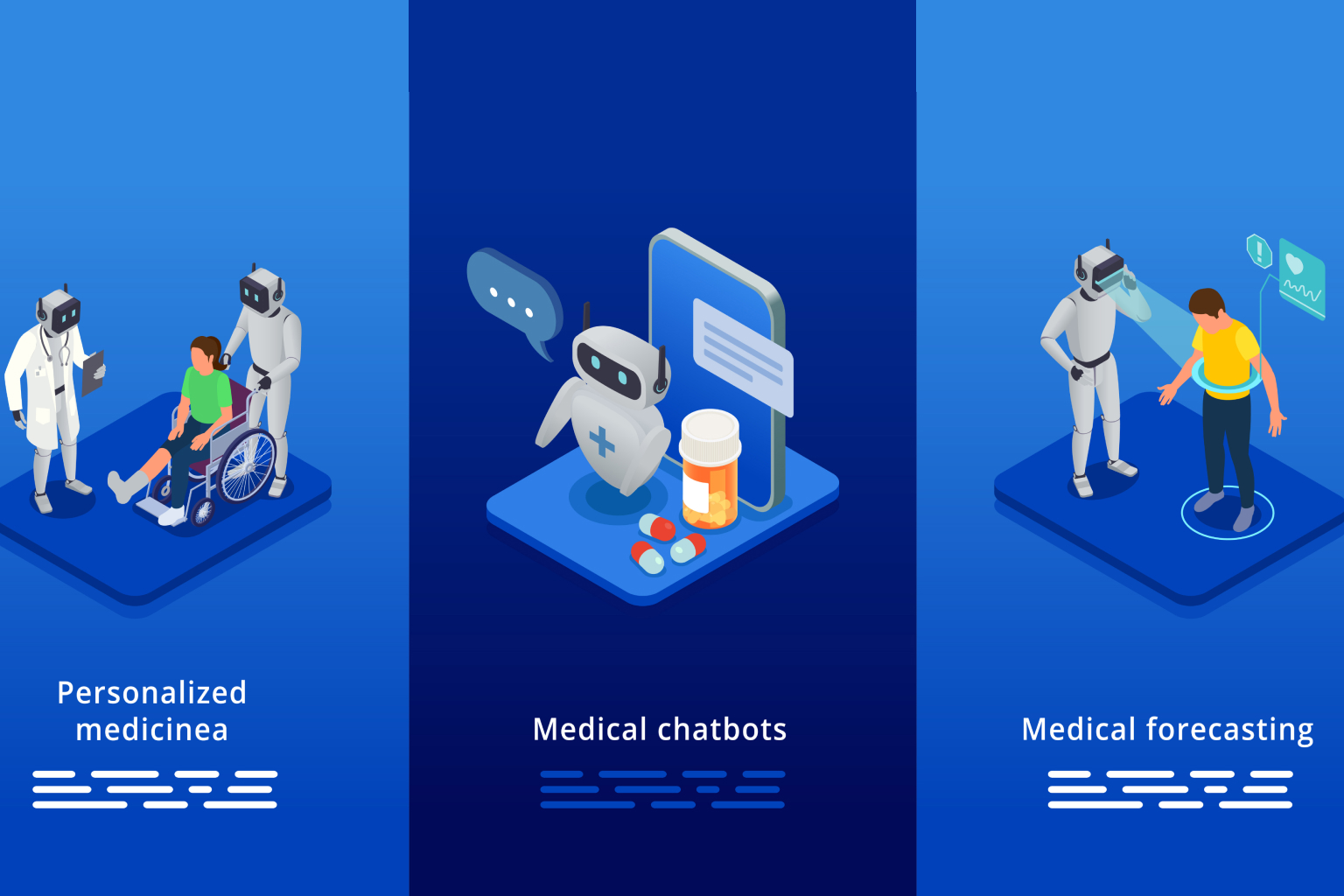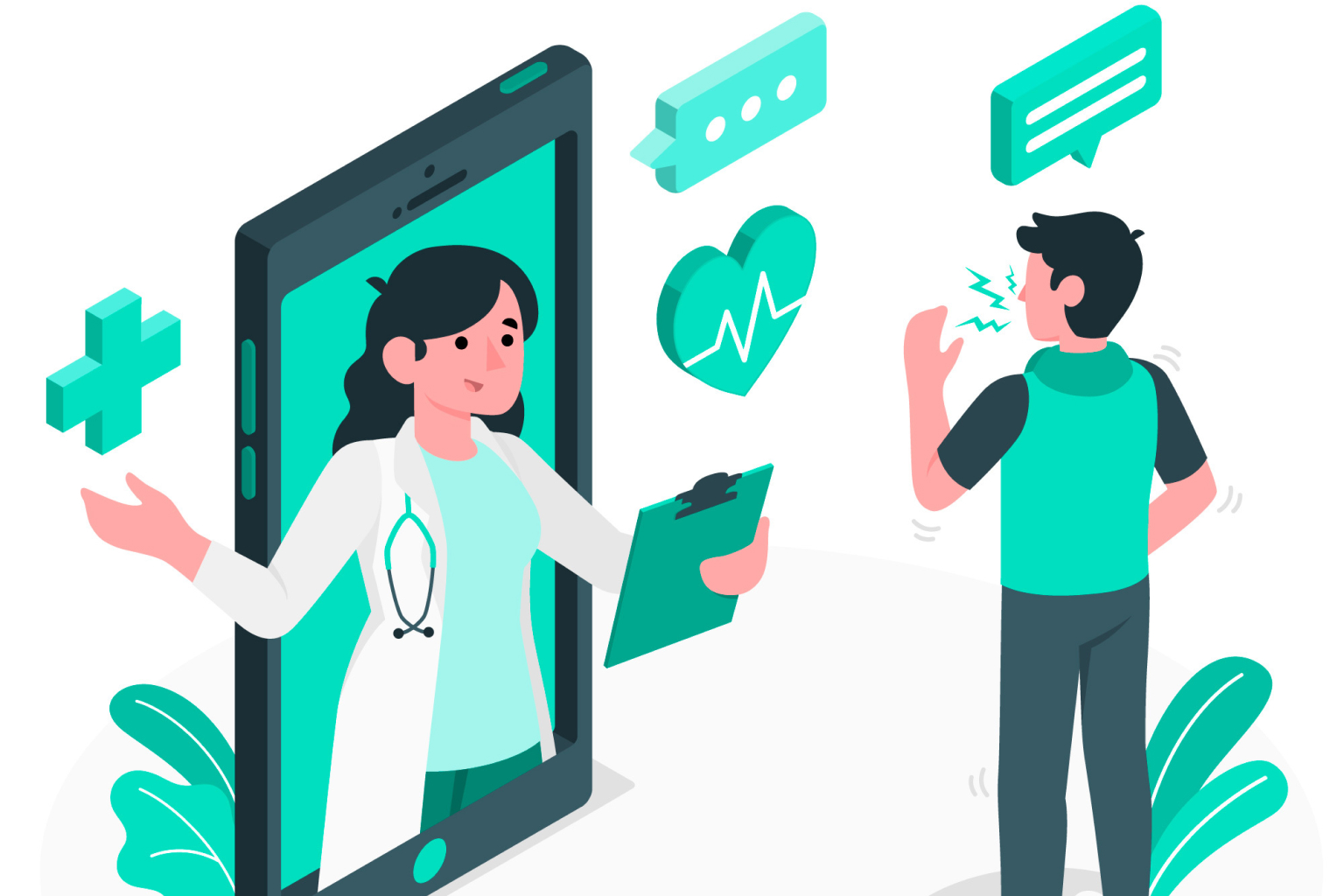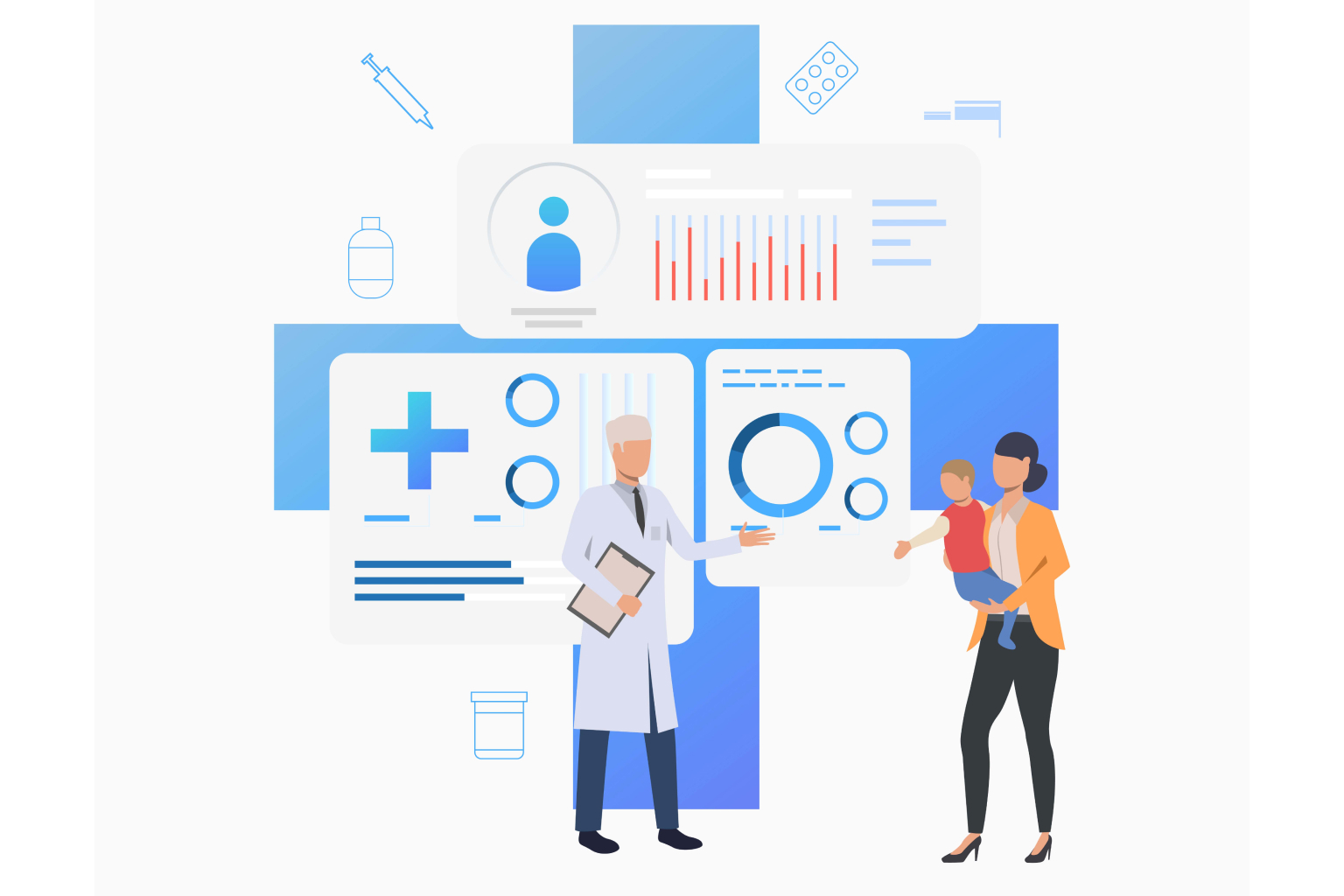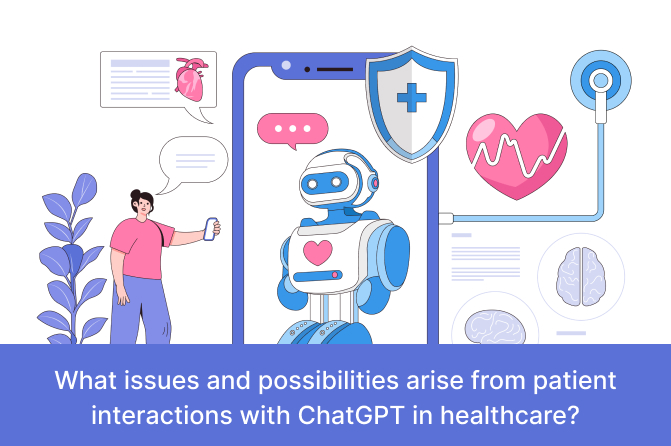ChatGPT an openAI tool in healthcare transforms patient interaction by providing virtual consultations, tailored health programs, and language barrier solutions. Despite problems such as accuracy and data privacy, ChatGPT improves communication, educates patients, and may lower healthcare expenditures. As technology advances, it holds the possibility of providing patients with individualized, timely healthcare information to enhance results.
Prepare for a significant revolution in the healthcare industry! Artificial intelligence (AI) is taking the globe by storm, including the healthcare sector. One of the most interesting AI developments is OpenAI’s ChatGPT, a pioneering language model. ChatGPT has already made an impact in a variety of industries, and it is now set to revolutionize patient participation and assistance in healthcare.
ChatGPT, or Conversational AI, is a machine learning model that understands and responds to natural language input. It can generate human-like reactions, making it a useful tool for healthcare providers. Using ChatGPT, doctors and nurses can easily communicate with patients, providing accurate information and answering queries in an understandable manner.
ChatGPT can also act as a customized health coach, giving individualized health recommendations based on a patient’s health history, lifestyle, and preferences. Advice on appropriate eating habits, exercise routines, and stress-reduction techniques can help patients maintain a healthy lifestyle.
In this post, we will look at how ChatGPT is being utilized in healthcare to increase patient communication and better the entire patient experience. ChatGPT is revolutionizing the healthcare sector with virtual consultations and individualized health plans. So, let’s get started and discover how this cutting-edge technology is changing the game for both healthcare professionals and patients.
Table of Contents
ToggleWhat is ChatGPT and how has it evolved?
To properly grasp ChatGPT’s potential in healthcare, one must first understand its origins and the technology that underpins it.
ChatGPT was the result of innovative research and development by OpenAI, an organization dedicated to developing cutting-edge AI solutions. ChatGPT is based on massive language models that interpret and generate human-like text.
But what prompted the invention of ChatGPT? Its predecessor, GPT-3, covered the way for this modern AI trend tool. GPT-3, or the third version of the Generative Pre-trained Transformer, received a lot of attention for its capacity to generate meaningful and contextually appropriate text.
Building on the success of GPT-3 and 3.5 ChatGPT — employing what Open AI calls “GPT 4” — improves these capabilities even more, offering more accurate and conversational responses.
The secret to ChatGPT’s success is the mix of transformer algorithms and machine-learning approaches.
Understanding the Basics of ChatGPT and Its Use in Healthcare
ChatGPT can be utilized in healthcare for a variety of purposes, including virtual consultations, personalization of health programs, and improving patient education and understanding. Using ChatGPT, doctors and nurses can easily communicate with patients, providing accurate information and answering queries in an understandable manner. Aside from that, ChatGPT can be used for regulation and symptom checking, making it an effective tool for remote consultations.
Doctors are like divine messengers. They work continuously to ensure their patients receive the finest possible therapy. However, the roles and responsibilities of healthcare workers have evolved over time. The transition from ancient chemists to modern-day doctors has been significant. In today’s world, ChatGPT in healthcare has taken on a new significance and offers unprecedented prospects.
ChatGPT, in addition to being a useful resource for basic medical concerns, demonstrates the promise of advanced AI technology in medical education.

The Challenges of Using ChatGPT in Healthcare
While AI-powered chatbots have played an important role in altering the healthcare scene, they face numerous implementation and integration hurdles. This section discusses the major constraints and challenges in deploying AI chatbot solutions in healthcare.
Integrating ChatGPT, or any AI-powered technology, into the healthcare sector presents a number of obstacles and potential restrictions. Understanding and resolving these barriers is critical for responsible and effective adoption in healthcare settings.
Accuracy and Reliability:
Challenge: AI systems, such as ChatGPT, rely on training data that may not always be accurate or reliable, particularly for complicated medical information.
Mitigation: Regularly training and fine-tuning ChatGPT with verified medical data can improve accuracy and dependability over time.
Privacy and Data Security:
Challenge: Healthcare data is highly sensitive and subject to strict privacy regulations. Using an AI system like ChatGPT raises concerns about data privacy and security.
Mitigation: Implement robust data encryption, comply with healthcare data privacy laws (e.g., HIPAA), and ensure that patient data is anonymized and used securely.
User Trust and Acceptance:
Challenge: Patients and healthcare professionals may be doubtful about relying on AI for critical healthcare interactions due to concerns about trust and understanding the AI’s limitations.
Mitigation: Educate users about how ChatGPT functions, its capabilities, and its limitations. Transparently communicate that ChatGPT is a tool to augment, not replace, healthcare professionals.
Ethical Considerations:
Challenge: Ethical dilemmas may arise concerning AI’s involvement in medical decision-making, accountability, and potential biases in the data used for training.
Mitigation: Establish clear ethical guidelines for the use of ChatGPT in healthcare, ensuring that it sticks to principles like fairness, transparency, and accountability.
Integration and Workflow Optimization:
Challenge: Incorporating ChatGPT seamlessly into existing healthcare workflows and systems can be challenging.
Mitigation: Work closely with healthcare professionals to understand their workflow and tailor the integration of ChatGPT to enhance efficiency without disrupting the existing processes.
Opportunities and Potential Applications
With the rapid progress of artificial intelligence (AI) technologies, the healthcare business has undergone substantial alterations in recent years. ChatGPT is one such development that has the potential to significantly improve communication and diagnostics. OpenAI’s modern language model has already demonstrated promising outcomes in a variety of domains, especially in healthcare.
As we investigate the future about what issues and possibilities arise from patient interactions with ChatGPT in healthcare, various opportunities, and possible applications emerge, altering how healthcare workers engage with patients and improving overall patient care.

1. Virtual Assistants for Patients:
ChatGPT can act as a virtual assistant for patients, giving individualized information, advice, and support. Patients can obtain immediate solutions to their questions and concerns when ChatGPT is integrated into healthcare platforms or mobile applications. Individuals can use a conversational interface to inquire about symptoms and drugs, as well as arrange visits. ChatGPT can provide accurate and reliable information, reassuring patients and empowering them to take control of their health.
2. Decision Support for Healthcare Professionals:
Healthcare proponents are continually confronted with complicated decision-making scenarios in which access to correct and current information is critical. ChatGPT can be an effective decision support tool, providing healthcare providers with real-time insights and recommendations based on vast medical expertise and research. For example, clinicians can use ChatGPT to help them diagnose rare or difficult cases, recommend treatment alternatives, and even forecast patient outcomes. This can help in clinical decision-making, reduce errors, and improve overall patient outcomes.
3. Mental Health Support:
ChatGPT integration has the potential to significantly improve mental health outcomes. Many people are hesitant to seek professional help because of the stigma attached to mental health disorders. ChatGPT can help bridge this gap by providing a nonjudgmental and accessible forum for people to share their mental health difficulties. ChatGPT can provide guidance and coping skills, as well as highlight potential mental health emergencies, prompting people to get appropriate help.
4. Language translation and Communication:
In a worldwide atmosphere, language limitations frequently delay effective communication between healthcare providers and patients. ChatGPT can help reduce this issue by acting as a real-time language translation tool. Healthcare practitioners can receive reliable translations in their preferred language by just typing or speaking in one language. This can considerably improve communication, allowing patients to accurately express their symptoms or worries, resulting in a better diagnosis and treatment.
5. Medical Education and Training:
ChatGPT can also transform medical education and training by serving as a virtual tutor or mentor. Medical students and healthcare workers can use ChatGPT to explain topics, request explanations, or practice simulated patient interactions. This interactive learning experience can improve medical knowledge, and diagnostic abilities, and assure ongoing professional development. Furthermore, ChatGPT may keep healthcare workers updated on the most recent research and medical advances, encouraging a culture of lifelong learning.
ChatGPT can help the healthcare industry in the following five ways:
ChatGPT has the potential to improve the healthcare industry by providing personalized support, assisting with medical research, enhancing patient education, streamlining administrative tasks, and allowing for remote consultations. ChatGPT’s natural language processing skills enable it to analyze massive volumes of medical data rapidly, provide specific insights to healthcare professionals, and facilitate communication between patients and providers, resulting in better outcomes and more efficient healthcare delivery.
Diagnosis & Treatment of ailments
ChatGPT can assist doctors in diagnosing and treating diseases. ChatGPT can provide relevant and exact diagnoses, leading to better patient outcomes, by analyzing symptoms, medical history, and other patient data.
Patient Communication
Effective communication is critical in the healthcare industry, and Chat GPT can greatly improve patient-provider communication. You can communicate with patients via ChatGPT, react to their questions, and provide them with necessary information, such as appointment times and medication schedules.
Medical Research
Chat GPT can assist medical researchers by processing and compressing massive amounts of data. Researchers can utilize this information to identify trends, correlations, and potential therapies for medical problems.

Electronic Health Records
ChatGPT can be used to analyze EHRs and provide insights into patients’ health. This allows healthcare providers to make informed decisions about patient treatment as well as discover potential health problems early on.
Mental Health
ChatGPT can assist address mental health issues. It can analyze patient data, identify trends, and provide personalized treatment plans. Patients can also receive therapy via chat GPT, which is especially useful for individuals who are unable or unwilling to pursue traditional therapy.
What are the future possibilities for ChatGPT in healthcare?
As AI advances, the application of ChatGPT in healthcare is anticipated to increase even further. For example, combining ChatGPT with Digital Transformation health platforms and robotics could result in novel solutions for remote patient monitoring, telemedicine services, and potentially robotic-assisted surgery.
Additionally, ChatGPT can be used in podcasts and LinkedIn groups for healthcare professionals to provide insights, answer questions, and create collaboration among industry experts.
As society considers the future, potential use cases and developments in healthcare systems will definitely emerge. As a result, healthcare professionals must stay educated about these developments and investigate how AI-powered solutions like ChatGPT may best serve their practices and patients.
The Final Thought:
Finally, generative AI chatbots like ChatGPT have the potential to transform how we interact with technology in domains such as research, medicine, and healthcare leadership. While AI chatbots have enormous promise to improve healthcare by increasing access, patient care, and efficiency, they confront substantial hurdles in data protection, bias, interoperability, explainability, and legislation. Addressing these problems through technology breakthroughs, ethical concerns, and legislative adaption is critical to realizing AI chatbots’ full promise in changing healthcare delivery while guaranteeing fair access and outcomes for all.
Despite these obstacles, there are numerous applications for What issues and possibilities arise from patient interactions with ChatGPT in healthcare. They can help patients and healthcare workers communicate more effectively, offer medical leaders real-time assistance and guidance, and enhance patient outcomes through individualized treatment plans and interventions.
However, certain difficulties must be addressed before these chatbots may completely achieve their potential. One important problem is ensuring that the information offered by these chatbots is accurate and reliable, as they are only as good as the data on which they are trained. Another problem is protecting the privacy and security of sensitive medical data.
As the technology supporting these chatbots advances, medical professionals and leaders must remain aware and engaged in the development and use of these technologies. By collaborating with Alphaklick, we will ensure that generative AI chatbots are fully utilized to benefit both patients and healthcare providers.
Reach out to our team right now!





















